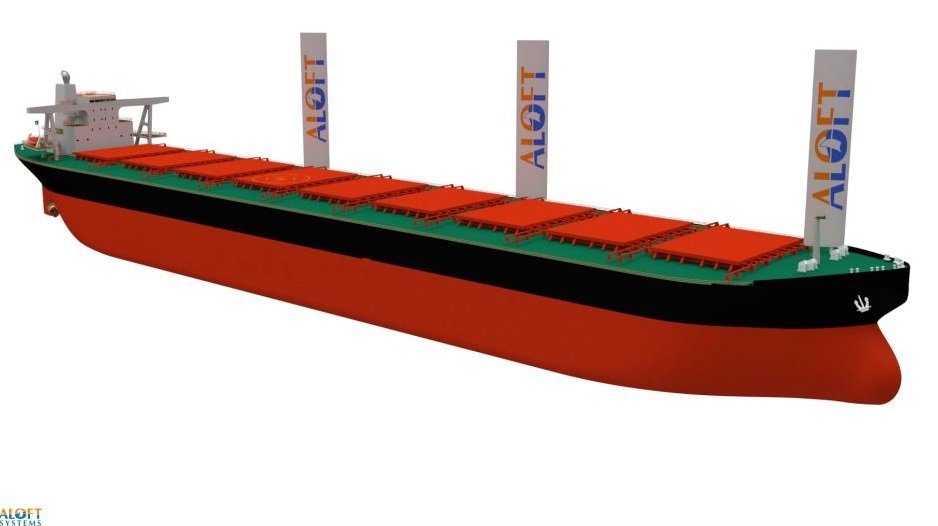A Second Wind: SeaAhead Catches Up with Satchel Douglas and Miles Keeney-Ritchie of Aloft Systems
Aloft cofounders Satchel Douglas and Miles Keeney-Ritchie at BlueSwell Cohort III’s first week
“Sailing” often conjures a different mental image than a shipping barge cruising into the sunset towed by huge, robotic sails. But that’s exactly the future Aloft Systems is creating.
The maritime shipping industry currently produces 3% of all global emissions, and comprises 10% of all shipping emissions, putting it on par with the aviation industry. Following the COVID-19 pandemic, demand for goods skyrocketed, and cargo ships remain one of the cheapest options for companies looking to transport goods internationally.
Miles Keeney-Ritchie and Satchel Douglas co-founded Aloft with the desire to help ships save fuel by tapping into a free, limitless resource: wind.
While many industries face rising pressure to cut CO2 emissions, the shipping industry has been largely immune. Shipping vessels are massive. Even multibillion dollar companies like Amazon command a small percentage of each vessel’s capacity, and therefore no one actor wields enough power to force companies to adapt more sustainable practices. Consumer pressure, however, is beginning to push the maritime industry to clean up.
Years spent working in ship design led Satchel to brainstorm practical solutions to the shipping issue that was both sustainable and easily implementable. He had the idea to reintroduce wind, a free and accessible resource, to offset the massive amounts of fuel expended in the shipping industry. He met Miles, and Aloft was born.
SeaAhead: When did you two first meet?
Satchel: Miles and I met at another accelerator that brought people together who are passionate about fighting climate change and who also have the skills and the connections to be effective entrepreneurs. My background is in ship design. I’ve worked in shipyards and design firms. Like a lot of industries, the maritime industry is slow to change.
I came to the accelerator with the idea to automate sails. They asked me in the interview how willing I’d be to work on someone else’s idea on a scale of one to ten. I said six but turns out it was zero.
Miles: The night before the program started, Satchel messaged the Slack channel to see if anyone wanted to meet up. I was the only one who came. We got Vietnamese food and sat in the park talking. Satchel brought up his idea to revamp our shipping system by making sails viable again.
SeaAhead: Did you start working together at that point?
Miles: Not immediately. I didn’t have a background in maritime. I came to the program thinking I’d work on electric car batteries or recycling. Satchel and I went our different ways at first, but we kept coming back to this idea of automating sails. So we decided to make a go of it.
Cohort III Demo Day
SeaAhead: How do the sails work?
Satchel: In a nutshell, we’re putting sails on a commercial vessel. Our sensors detect when the wind is blowing and put the sails up to help move the boat forward.
SeaAhead: What brought you to the BlueSwell program?
Miles: BlueSwell matched really well with Aloft’s development cycle. We needed to identify a more focused market with an acute need. And we found that in the construction vessels supporting offshore wind development in the US.
There’s an impending boom of wind construction. And to do that, we’re going to need hundreds of new vessels making thousands of trips from the shore.
The project developers are typically European companies or their subsidiaries that are putting pressure on their subcontractors to reduce emissions. But here in the US, those subcontractors are mostly oil patch vessels that aren’t used to reducing their emissions or saving fuel. They’re under new pressure without any obvious solutions. That’s where wind can play a significant role.
SeaAhead: What’s been the most useful takeaway during your time in the program?
Miles: Definitely the network. Getting advice and having conversations about shared struggles with our cohort was great, and the help from the SeaAhead folks has been invaluable. Also, the support in honing our pitch was really useful.
Satchel: We’re in the classic scenario of having a technical solution that requires some background knowledge to understand, and we’re talking to people who don’t necessarily have that foundation.
Miles: We’ve worked with storytelling experts through SeaAhead to frame why this is a problem worth solving, and how Aloft can solve it.
---
Learn more about Aloft Systems.



